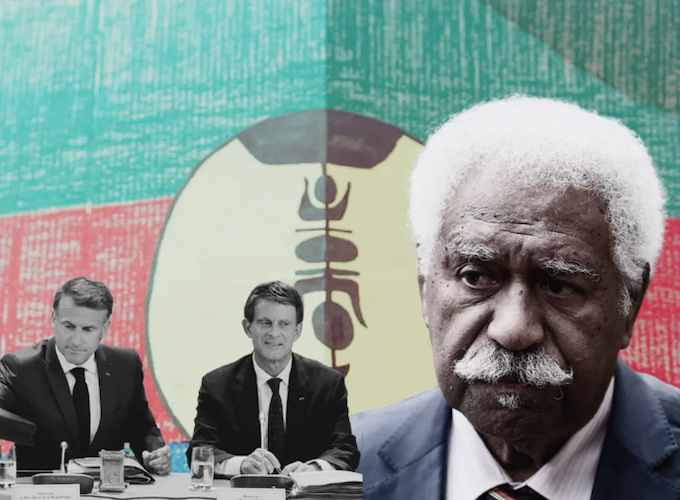
By Lydia Lewis, RNZ Pacific presenter/bulletin editor
A former New Caledonia Congress president says there are “not enough” benefits for Kanaks in a new “draft” agreement he signed alongside pro and anti-independence stakeholders in France last month.
Roch Wamytan said that, after 10 days of deadlock discussions in Paris, he failed to secure the pro-independence mandate.
He told RNZ Pacific that he refused to sign a “final agreement”.
- READ MORE: New Caledonia’s oldest party for independence rejects ‘Bougival’ deal
- Other Kanaky New Caledonia politics
Instead, he said, he opted for a “draft” agreement, which is what he signed. It has been hailed as “historic” by all parties involved.
While France maintains its “neutrality”, Wamytan said that at the negotiating table it was two (France and New Caledonia’s pro-France bloc) against one (pro-Kanaky).
A main point of tension was the electoral law changes, which sparked last year’s civil unrest.
“We call on France to respect the provisions of international law, which remains our main protective shield until the process of decolonisation and emancipation is completed. Hence, our incessant interventions during negotiations on this subject [electoral law changes],” Wamytan told RNZ Pacific.
He said it was difficult to understand whether France wanted to decolonise New Caledonia or not.
Concrete measures
“We have a lot of concrete measures in this proposed agreement, but the main question is a political question. Where are you [France] going with this? Independence or integration with France?”
The document, signed in the city of Bougival, involves a series of measures and recognition by France of New Caledonia as a “State” as well as dual citizenship — French and New Caledonian — provided future New Caledonian citizens are French nationals in the first place.
But this week, New Caledonia’s oldest pro-independence party, the Union Calédonienne (UC), officially rejected the political agreement signed in Paris.
Wamytan maintains New Caledonia is not France. But the French ambassador to the Pacific has previously told RNZ Pacific New Caledonia is France.
However, Sonia Backès, the leader of the Caledonian Republicans Party and the president of the Provincial Assembly of Southern Province, says the agreement signed in France is “final”.
“Roch Wamytan and the pro-independence delegation signed an agreement in Bougival. Since their return to New Caledonia, their political supports have been fiercely critical of the agreement,” her office said via a statement.
“As a result, radical pro-independence leaders like Roch Wamytan have chosen to renege on their commitment and withdraw their signature. This agreement is final; there is no other viable political balance outside of it.”
So why did Wamytan sign?
When asked why he signed the draft agreement when he did not agree with it, he said: “After the 10 days they obliged us to sign something.”
“We told them that we [didn’t have] the mandate of our parties to sign an agreement, but only a ‘project’ or ‘draft’.
“It was important for us to return with a paper and to show, to explain, to present, to debate, for the debate of our political party. This is the stage where we are at now, but for the moment, we do not agree with that.
“We [tried] to explain to [France and pro-France bloc] that we have a problem [with electoral law change being included].
“This is our problem. So we signed only for one reason . . . that we have to return back home and to explain where we are now, after 10 days of negotiation. [Did we] achieve the objectives, the mandate given by our political parties?”
He said one thing he wanted to make clear was that what he had signed was not definitive and was now up for negotiation.
An FLNKS (Kanak and Socialist National Liberation Front) Congress meeting is set down for this weekend with the Union Calédonienne Congress meeting held a weekend prior.
Wamytan said that it was now up to the FLNKS members to have their say and decide where to next.
“They will decide if we accept this draft agreement or we reject,” he said.
“We have two options: we accept with certain conditions, for example, on the question of the right to vote on the electoral rule. Or for the question of the trajectory from here to independence, through a referendum or the framework proposed by President Macron.”
“This is an important element to discuss with France, but after this round of discussions.”
He expected further meetings with France after community consultations.
Communication problem
Wamytan admitted that the pro-independence negotiators did not communicate clearly about the agreement to their supporters.
He said after signing the document, President Macron and the pro-France signatories were quick to communicate to the media and their supporters — and the messages filtered to his supporters resulting in anger and frustrations.
He said the anger has mostly been around the signing itself, with people mistaking the draft proposal as final.
“The political, pro-Kanaky party were very, very, very angry against us. We did not communicate and this I think is our problem.”
Bribery allegations
Wamytan has also dismissed unconfirmed reports that negotiators were bribed to sign a historic deal in Paris.
He said he was aware of people “chucking accusations of bribery” around, but said they were false.
“It has never been in the minds of Kanak independence leaders doing such practices,” he said.
“After the signature of the Matignon Accord 37 years ago, with [FLNKS leader Jean-Marie Tjibaou] and with us after the signature of Nouméa accord in 1998, we heard about the same allegation and some rumours like this.”
This article is republished under a community partnership agreement with RNZ.










































